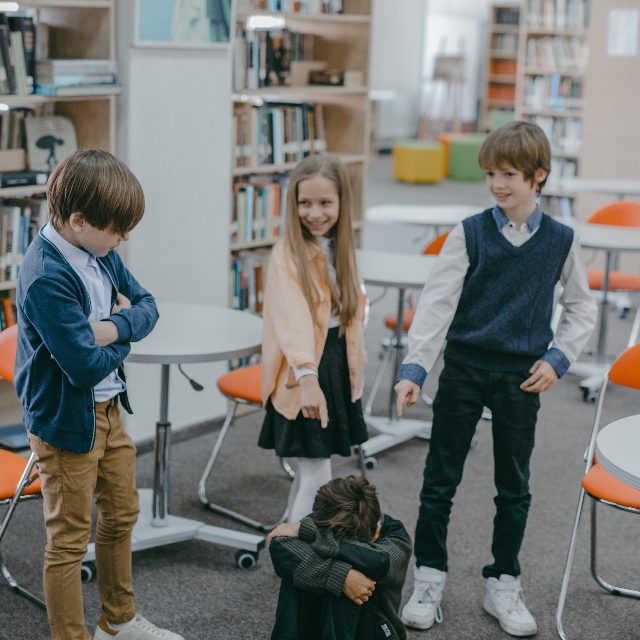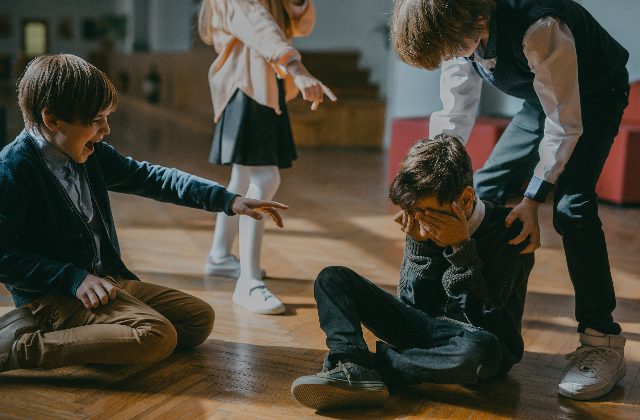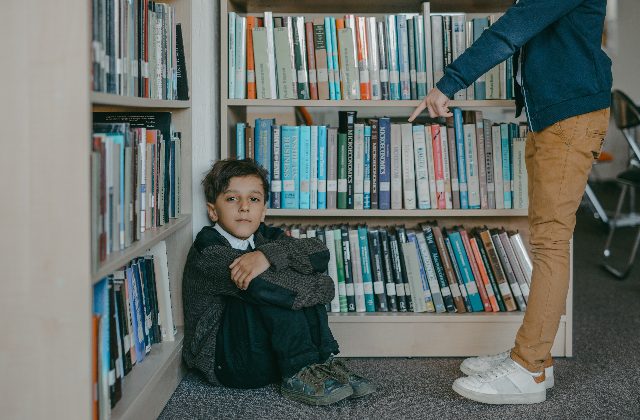
Your kid brings a bad attitude home from school. A friend made them feel inadequate in some way by saying something hurtful, making a negative comparison, or comparing them to someone else.
As a parent, you are designed to protect your child. Hence, on hearing the news that friends are mean to your child, you might want to rush out to the playground to confront the child and tell them how to treat your child.

However, you are an adult and are aware that acting impulsively is never a good decision.
Here are some tips on what to say to your child when friends are mean.
When is a Friend Mean?
Someone who says something hurtful just once feels remorse, and apologizes to you is not a mean friend.
However, if a friend is mean, they may be an apology, but this kind of friend will likely continue to act in this way, creating a potentially dangerous circle.
Or they could behave nicely around grownups yet act cruelly when no one is looking.
Ask your child; Is your friend your friend if they constantly make fun of you, insult you, say harsh things about you, and put you down?
For an adult, the solution might be obvious, but for your child, it might not be.
There are several causes for why a child might behave badly.
Oftentimes, these kids lack some emotional intelligence and emotional regulation. Because of unstable attachment, some people may act aggressively and cruelly.
A child who is very insecure and uses narcissism to make up for it is referred to as a mean friend.
The characteristic of a mean kid is that they are utterly unaware of and do not care how their acts and words affect someone else.
To feel secure in the friendship, they have to tear the other kid down.
What To Say to Your Child When Friends Are Mean

1. Be Informed
Most of the time, kids are skilled at keeping their feelings about friends that are mean hidden from parents.
If possible, try to arrange for kid friends to play in your house so you can watch from a distance if you have any worries.
2. Disrupt the Circle
If the visiting friend is being mean to your child, disrupt the circle with other activities which you are involved.
Such as putting in a DVD to stop whatever is going on and make arrangements to end the visiting session.
3. Communicate
You might try discussing your worries if you know the other parent well enough to feel at ease bringing up a sensitive subject.
Getting these children therapy now can make a major impact since they are more likely to experience problems as adults if they exhibit this kind of cruel behavior as children.
4. Increase Your Child’s Social Network
Your child might still need to interact with this mean child at school or in the neighborhood.
But, if you make a point of inviting other kids over to play or registering your child for an activity with a new set of potential friends, the mean friend will soon become undesirable.
Part of what to say to your child when friends are mean includes asking your child, why would he hang out with someone mean when he has so many other friends.
5. Ignore the Actions or Leave the Area
When your child declines to take part in the mistreatment, it defuses the situation.
While your child needs to learn how to stand up for himself when bullies are around, in some difficult situations he may need to ignore the conduct or walk away.
6. Define a Limit
Your child can simply express disapproval; “You need to stop saying mean things, teasing, and leaving me out of the conversation.”
He shouldn’t be scared to state his next course of action if the mean behavior persists, such as leaving or reporting it to an adult.
7. Identify the Behavior
Your child must state the dynamic if the friend violates the established boundaries.
They should genuinely use phrases like “You’re being cruel,” “You’re being hurtful,” and “You’re being impolite.”
Your child is refusing to be prompted to retaliate with greater violence by naming what is taking place.
8. Say The Unexpected
Saying and doing unexpected things when someone says something you don’t like can sometimes genuinely confuse the mean friend.
If a mean person questions, “Why are you wearing that outfit?” You look like a clown, your child might respond, I’m a clown.
The mean kid who made the offensive remark likely won’t know how to reply to such an unexpected reply.
9. Pay Attention Without Passing Judgment
What to say to your child when friends are mean entails paying attention to your child’s complaint without being judgmental.
As your child describes what occurred to him, pay attention without interrupting or making judgments.
Be sympathetic and make an effort to tell your child that you will always adore him no matter what is said concerning him.
If the mean event was a one-time occurrence, kindly inquire as to what else transpired that day with your child. Try to learn the complete truth.
You must therefore assist your child in comprehending whether he unintentionally or purposefully did something harmful and whether it resulted in retaliation from a classmate or friend.
Part of learning is helping your child comprehend why something occurred.
10. Is it Jokes, Banter, or Teasing?
Children occasionally form groups and joke around with one another or their classmates.
Therefore, speak to the class instructor, the school principal, or the other parents before you storm out to vent your anger.
Check to see whether your child just misinterpreted a joke. Or were the others just making fun of him?
Likely, your child will occasionally view another child as mean for refusing to share a snack with him, excluding him from a game, etc.
Additionally, your child should learn how to interpret events appropriately.
11. Instill Interpersonal Skills
Teaching your child empathy and social skills is crucial.
Your child will, of course, learn from observing how you and your spouse interact with one another and with the housekeepers.
Show your child what it is to have empathy so that your child can learn to comprehend what another person is going through.
This will prevent your child from purposefully making fun of or hurting another child.
Similarly, your child must understand how to cooperate in a team, share, and other such skills.
12. Act Out Such Scenarios
Role-playing similar situations with your child at home is a fantastic method to support them in handling them.
As a result, you could pretend to be the mean’ kid and say or do something hurtful to get the appropriate reaction from your kid.
You might even flip roles and let your kid play the bad kid to understand what it’s like to be in charge, exclude someone from a game, etc.
He will see the matter more clearly after doing this.
There is no doubt that role-playing can be beneficial. It provides the child with first-hand practice using assertiveness.
Role-playing is also beneficial, as is reassuring your child that friendships typically come and go and that it’s acceptable to realize that a friendship may end if a friend persists in being mean.
13. Boost Confidence
You must instill in your child the values of respect and tolerance as a parent.
What to say to your child when friends are mean has to do with you equipping your child to communicate to the mean kids, such as “I don’t like what you are saying.”
Being an effective parent entails making the time to listen to and be there for your child. To be able to do this, you must have self-confidence.
Additionally, it’s important to raise your child properly since, if adults can act cruelly toward one another, why can’t kids?
Therefore, give your child the self-confidence and life skills they need to deal with meanness or undesirable behavior.
14. Offer Your own Experiences
Help your child express their worries about their friend by paying attention to their worries.
Then, talk about your own similar experiences, express concern for the other child with empathy, and work through the issue with your child to come up with a considerate solution.
15. Encourage Them To Speak Out For Themselves
Teach your kids how to assert themselves if you haven’t done that previously.
Parents should give children as much independence as possible in handling their problems but also coach them closely on how to do this.
Teach your child to use ‘I’ statements to convey disapproval like, “I don’t enjoy being called names, so stop now.”
16. Promote Self-awareness
Another helpful strategy for figuring out what to say to your child when friends are mean is to observe the situation from an unbiased perspective.
Parents guide their children in recognizing how their behavior is making interaction difficult with the mean kids.
Also, helping your child change his behavior causes the other child to behave differently.
Limiting interactions with the mean kids may be important, but if this is not possible, parents should encourage their child to only interact with the mean kid while other kids are present.
17. Establish Coping Mechanisms
Be prepared to break off communication if everything else fails.
Reduce the amount of contact between your child and the mean kid if you can, observe their interactions, and if required, involve instructors, coaches, and the mean child’s parents.
Help your child find appropriate methods to avoid their friend if the fight persists and find other things to do when they’re in the same place, such as reading, sketching, or looking for another child to play with.
They might sometimes be in the same place but engaged in different tasks because parallel play helps to reduce tension.
Your child needs to know that it’s unhealthy to feel emotionally drained after spending time with a “friend” and that friendships can come and go.
If it comes to that, and your child decides to break up a friendship, give them additional love and support, boost their self-esteem, accept their feelings of hurt and loss, and give them space to grieve.
What Should You Not Do When Your Child’s Friends Are Mean?
It could be tempting for you to say unhelpful things about a mean friend when speaking with your child about that mean friend or their actions.
But you must fight the impulse to do so if you want to encourage your child to grow into a better person.
We make so many judgments about individuals based on their actions, and we label them as bullies and mean when perhaps they are in pain and are unaware of how offensive they are.
Since we don’t always know what motivates someone else’s actions, we must teach our children to refrain from making snap judgments about it.
Upon hearing our child was mistreated, you’re wired to just run into the schoolyard and defend your kids.
Alternatively, why not call the parent of your child’s classmate or the instructor right away? Also, you may want to keep your distance.
You will make the situation worse by stepping in and attempting to solve it by defending your child.
Children find it unpleasant and degrading, and it lets them know that you don’t have to believe in their problem-solving abilities.
It is advised you encourage your child to defend himself and find his voice rather than rushing in to save him.
Conclusion
What to say to your child when friends are mean?
When your child experiences mean conduct from anyone, in any situation, you want to help them build coping mechanisms that they can use.
However, If attempting to assist your child’s friendship improvement is unsuccessful; some kids simply shouldn’t be friends.
Additionally, if your child spends too much time with a bad friend, it prevents him from making genuine connections with other kids who would treat him well.
It is worthwhile to assist children in ending relationships that aren’t beneficial to them because a good friendship is a learning and fulfilling experience.
Leave a Reply
You must be logged in to post a comment.